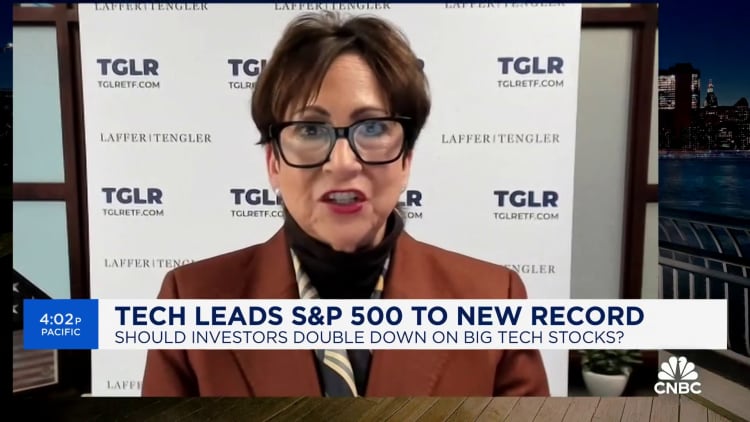People walk through the Financial District by the New York Stock Exchange (NYSE) on the last day of trading for the year on December 29, 2023 in New York City.
Spencer Platt | Getty Images
The S&P 500 stock index climbed to a new all-time high on Monday.
A bull market — by two definitions — is here. Last year, the S&P 500 rose more than 20% from its most recent low. As of Friday, it crossed another bull market threshold when it surpassed its previous high.
For investors who want to get in on the action, the good news is that investing in a fund that tracks the S&P 500 index is an easily accessible strategy.
But experts say it also deserves a word of caution: Past performance is not indicative of future returns. And while the S&P 500 was a clear winner in 2023 — finishing the year up 26%, including dividends — it may not be the strategy that comes out ahead at the close of 2024.
What is the S&P 500 index?
The S&P 500 includes around 500 large cap equity stocks. The index is a market cap-weighted index, which means each company’s weighting is based on its market capitalization, or the total value of all outstanding shares.
The top companies by weight include Apple, Microsoft, Amazon, Nvidia, Alphabet (with two share classes), Meta, Tesla, Berkshire Hathaway and JPMorgan Chase.
Information technology represents the largest sectorwith 28.9% of the index. A recent rally of big tech names has helped push the index to its recent highs.

How can you invest in the S&P 500?
Today, investors may choose from mutual funds or exchange-traded funds that track the index. Among the biggest ETFs are: SPDR S&P 500 ETF Trust, iShares Core S&P 500 ETFand Vanguard S&P 500 ETF.
Vanguard in 1975 created the first index mutual fund that tracked the S&P 500. Vanguard founder John Bogle was famously a proponent of investing in a broad index fund.
“Simply buy a Standard & Poor’s 500 Index fund or a total stock market index fund,” Bogle wrote in his book, “The Little Book of Common Sense Investing.”
“Then, once you have bought your stocks, get out of the casino — and stay out,” he wrote. “Just hold the market portfolio forever.”
More from Personal Finance:
Why egg prices are on the rise again
A 12% retirement return assumption is ‘absolutely nuts’
Here’s where prices fell in December 2023, in one chart
For stock investors who want to keep their strategies simple, experts say the approach can work.
“Among the better decisions people can make is starting with an index-based fund tracking the S&P 500 because it works,” Todd Rosenbluth, head of research at VettaFi, recently told CNBC.com.
Over time, passive strategies have shown better returns than actively managed funds. Moreover, the cost of those funds is much lower compared to active strategies. Together, that combination is hard to beat.
“I don’t think individual investors or money managers can generally outperform the S&P 500,” said Ted Jenkin, a certified financial planner and the CEO and founder of oXYGen Financial, a financial advisory and wealth management firm based in Atlanta. Jenkin is also a member of the CNBC FA Council.
When does it pay to diversify?
The greater a portfolio’s exposure to the S&P 500 index, the more the ups and downs of that index will affect its balance.
That is why experts generally recommend a 60/40 split between stocks and bonds. That may be extended to 70/30 or even 80/20 if an investor’s time horizon allows for more risk.
Moreover, exclusively investing in the S&P 500 on the stock side of a portfolio may be limiting if other areas of the market prove more successful in 2024.
In 2023, the S&P 500 was up around 26% for the year, besting other strategies like a U.S. small cap index fund or an international stock index fund, noted Brian Spinelli, a certified financial planner and co-chief investment officer at Halbert Hargrove Global Advisors in Long Beach, California, which was No. 8 on CNBC’s FA 100 list in 2023.
It may be tempting to throw out those other strategies and just go with the one that did really well last year, Spinelli noted.
“But I wouldn’t go overboard,” Spinelli said. “You shouldn’t be 100% U.S. large cap and let it sit there and expect the same level of returns we’ve seen over the last five years.”













.jpg?w=700&c=0)

















































